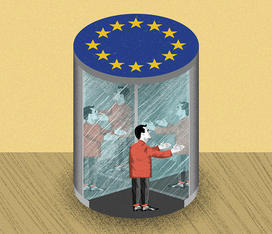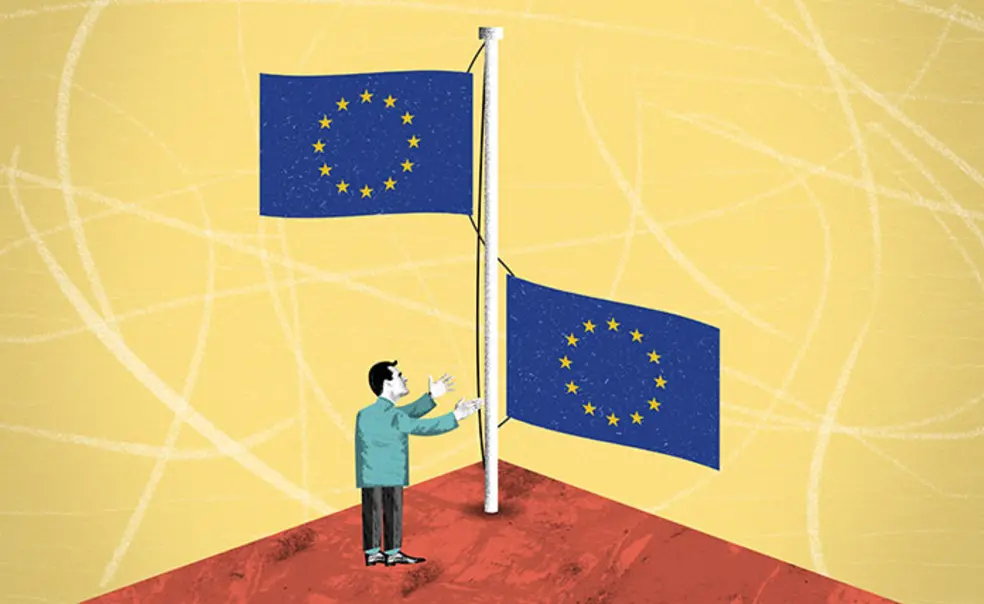Political punditry is like stock-market investment: Those who base hasty predictions on current headlines generally lose, and those who focus on structural fundamentals generally prosper.
The enormous publicity surrounding Brexit typifies a rush to misjudgment. While Europe does face long-term threats, Brexit is not one of them.
Here’s why: Under no circumstances will Britain actually leave Europe. London may seek to change its formal status, but the best option is to renegotiate the terms of its EU membership. Another option — less desirable because it means accepting EU rules without any input into them — would be to negotiate an associate status resembling Norway or Switzerland.
Yet in either case, Britain has every incentive to keep in place nearly all EU policies it currently pursues. Call it the “Hotel California” effect: You can check out any time you like, but you can never leave.

Most important among these policies is the UK’s membership in the EU single market, which Foreign Minister Boris Johnson has promised to preserve. British producers (and even more so, foreign investors) cannot forgo preferred access to a region that takes about 45 percent of their exports.
Though immigration figured prominently in the referendum debate, cabinet ministers have promised to protect the rights of current migrants. Anything else would mean abandoning 1.3 million Britons who live on the Continent with EU-protected medical care, voting, residency, and employment. Nor is it feasible to expel some 3 million Europeans in the UK, most working in roles essential to current British businesses. (In any case, 70 percent of UK immigrants are non-European, and their status will not change.) Common visa arrangements are also vital, lest Britons — and, equally important, foreign investors — be forced to apply for a visa every time they cross the channel.
Britain participates in EU arrangements to combat crime, human trafficking, illegal immigration, and terrorism. It shares data on every person who legally enters Europe. The new prime minister, Theresa May, made her political reputation as a tough law-and-order home secretary who supported these policies. She is unlikely to reverse them.
Britain also cooperates with Europe on foreign policy and defense matters, and conservative politicians are the strongest supporters of such efforts.
Cooperative scientific research and EU student exchanges benefit British students and universities, and like many other policies, involve EU expenditures, the cost of which Britain would be expected to share — as do Switzerland and Norway.
When one adds it up, Britain has surprisingly little to gain by picking and choosing among EU policies — even if it could. It is already exempt from the big EU policies it finds onerous, including the euro; Schengen border-control rules; and almost all social, employment, and immigration policies. In any case, given its small size compared to the EU, it lacks enough bargaining power to force a better deal.
So British politicians are beginning to backtrack. Politicians who favored (publicly or privately) remaining in the EU, including May herself, dominate the government. Without a clear alternative plan, Britain is delaying the launch of negotiations. The government is likely to muddle through for up to five years until a combination of public forgetfulness and buyer’s remorse permits a compromise with Europe.
This is not mere speculation. The last six times an EU referendum resulted in rejection of a major European policy — in France, Netherlands, Greece, Denmark, and twice in Ireland — the outcome was reversed with little public outcry. The truth is that the positive benefits of European policies are simply indispensable to a modern, interdependent nation.

Andrew Moravcsik is a professor of politics and international affairs at the Woodrow Wilson School and director of the European Union program at Princeton.












No responses yet